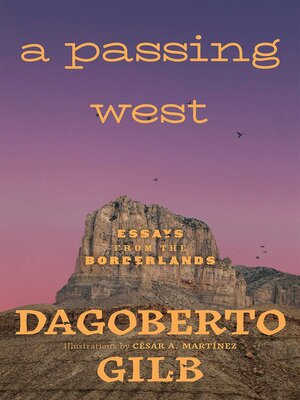
Sign up to save your library
With an OverDrive account, you can save your favorite libraries for at-a-glance information about availability. Find out more about OverDrive accounts.
Find this title in Libby, the library reading app by OverDrive.



Search for a digital library with this title
Title found at these libraries:
| Library Name | Distance |
|---|---|
| Loading... |
Winner of the Pen/Diamondstein-Spielvogel Award for the Art of the Essay. Essays on the west, the Chicano movement, by one of its founders.
Winner of the 2025 PEN/Diamondstein-Spielvogel Award for the Art of the Essay
A unique voice in American fiction, Dagoberto Gilb is also a singular writer of personal and journalistic essays. In A Passing West he casts a penetrating gaze upon the culture and history of the Southwest, Mexican American identity, and his own family.
Gilb has a forceful message for readers: there is a Mexican America, and its culture is the lifeblood of the Southwest United States, which was Mexican land until the Treaty of Guadalupe Hidalgo. The rest of the country, Gilb declares, does not want to know or respect the long history of Mexican America. His mission is to defend and proclaim its beauty and importance.
Ranging from accounts of research in Spain's Archivo General de Indias and the culture of farming corn in Iowa to meditations on Mexican and Mexican American writers, deconstructions of Mexican American food, and the experience of teaching students confused about their own culture and identity, these sharply observed portraits are both thought provoking and entertaining. His parents, his youth and manhood, his new disabled life, and snapshots of Mexico City and Guatemala, California, and Texas—all are unforgettable thanks to Gilb's brilliant vision and style.
Winner of the 2025 PEN/Diamondstein-Spielvogel Award for the Art of the Essay
A unique voice in American fiction, Dagoberto Gilb is also a singular writer of personal and journalistic essays. In A Passing West he casts a penetrating gaze upon the culture and history of the Southwest, Mexican American identity, and his own family.
Gilb has a forceful message for readers: there is a Mexican America, and its culture is the lifeblood of the Southwest United States, which was Mexican land until the Treaty of Guadalupe Hidalgo. The rest of the country, Gilb declares, does not want to know or respect the long history of Mexican America. His mission is to defend and proclaim its beauty and importance.
Ranging from accounts of research in Spain's Archivo General de Indias and the culture of farming corn in Iowa to meditations on Mexican and Mexican American writers, deconstructions of Mexican American food, and the experience of teaching students confused about their own culture and identity, these sharply observed portraits are both thought provoking and entertaining. His parents, his youth and manhood, his new disabled life, and snapshots of Mexico City and Guatemala, California, and Texas—all are unforgettable thanks to Gilb's brilliant vision and style.







